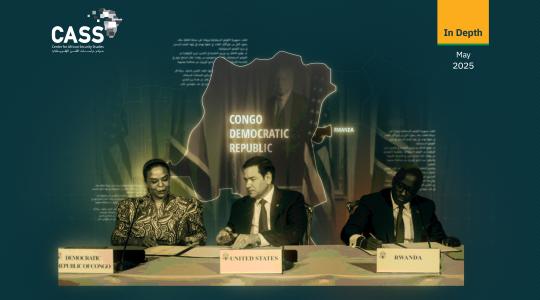As Tunisia’s political and economic crisis rolls on, the penetration of special interest networks in state institutions is becoming ever more clear, as is the extent to which they are manipulating the tenders system for public contracts, excluding of national institutions in favor of private business interests.
Sources told CASS that senior officials at the Ministry of Equipment, Housing and Infrastructure have been exerting pressure against Sumatra, a government-owned construction and infrastructure company, in order to enable private companies to undertake major public projects. By seeking to exclude Sumatra, they are overriding the principle of equal opportunity and potentially incurring heavy financial losses for the state treasury.
Deliberate, Systematic Exclusion of Public Institutions
Sources told CASS that the Ministry was rife with power struggles, in which public administration mechanisms are being used to exclude state-owned companies from strategic projects in favor of specific private firms. Sumatra, which is meant to be a key player in major infrastructure projects within the government’s public procurement system, has come under pressure from an organized campaign to exclude it from national projects, particularly the Tunis-Jelma highway project.
This exclusion owes to the influence of a network within the ministry, run by influential individuals who have facilitated the deal being awarded to Medibat, a company owned by businessmen Mohamed and Faisal Obeid. In a short period of time, Medibat turned from a firm with pressing financial difficulties into one of the largest beneficiaries of government contracts.
The Tunis-Jelma highway project was not the first such case. Sumatra had previously been excluded from a project to build a bridge in the nearby coastal city of Bizerte, whose cost was inflated from 200 million to one billion dinars ($322 million). Various other firms have emerged, which between them have monopolized major projects and imposed prices far exceeding the original estimates.
Corruption Networks: From Within and Without
Sources told CASS that foreign funders of such projects have consistently imposed contractual conditions that exclude Tunisian companies from competing for major projects, giving foreign companies exclusive access to them and allowing them to charge above-market prices. These policies are not arbitrary, but are rather part of a mechanism of collusion between ministry officials and donors, under which Tunisia is forced to accept conditions that exclude national companies, contradicting the principle of state sovereignty over its own economic decisions.
The role of former Minister Mohamed Saleh al-Arfaoui is a case in point. Reports indicate that he approved the a set of unfair conditions during his tenure as minister, preventing government institutions from participating in major contracts. Sources also confirm that Arfaoui owned shares in Medibat, which would help explain the privileges the company has enjoyed and its monopoly on public works contracts in recent years.
The network’s activities have not been limited to the construction sector, but have extended into real estate, with dubious deals were concluded that benefited specific circles at the expense of the public purse.
Presidential Dismissals: A Step Toward Reform or a Settling of Scores?
In late February, President Kais Saied dismissed a number of senior officials from the Ministry of Equipment and Housing, including Chief of Staff Burhan Hmeida, Inspector-General Jalal Moulehi, and Director General of Coordination between Regional Administrations, Mourad al-Hamrouni. Hatem Aichaouia, a close associate of Saied, was appointed as the new Chief of Staff. Meanwhile, the positions of General Inspector and Coordination between Regional Administrations remained vacant, raising questions about the nature of these measures and whether they would help dismantle corruption networks within the ministry.
These surprising measures came after a meeting between President Saied and the Minister, Sarra Zaafrani Zenzri—later appointed prime minister—to urge her to expedite the implementation of major infrastructure projects, not least the Tunis-Jelma highway and the Bizerte Bridge. However, the lack of transparency over the reasons for the dismissals, and the failure to appoint replacements, has increased doubts over whether these steps are part of a genuine reform process or simply part of a political and administrative settling of scores within state institutions.
While these dismissals may seem like a positive step toward tackling corruption at the ministry, they do not necessarily signify success or demonstrate a true intention to dismantle networks of corruption that control the resources Tunisia’s government institutions. This is because the “deep management,” based on the planting of officials loyal to specific centers of influence, remains an obstacle to any real reform.
Such officials, appointed to strategic positions within the administration, seek to protect the interests of influential groups, and use their powers to obstruct any measures that might infringe on their privileges, whether by obstructing the implementation of projects or by manipulating public contracts.
Therefore, confronting this phenomenon will require more than mere administrative changes. It will need in-depth investigations to expose the presence and practices of these networks within the ministries, reviews of government contracts already concluded, and efforts to restore the reputation of government institutions by giving them priority in implementing strategic projects. It will also require imposing strict oversight over foreign funding to ensure that it does not include discriminatory conditions that exclude national companies in favor of firms with dubious interests.
Ultimately, the case remains an indicator of the major challenges Tunisia faces in managing its public sector, particularly in light of the growing economic influence of interest lobbies. This poses the question: will the state be able to impose radical reforms that restore the prestige of its public institutions, or will these dismissals merely be the latest episode in a series of “redistributions of interests” within the administration?




